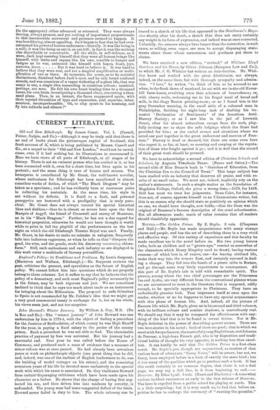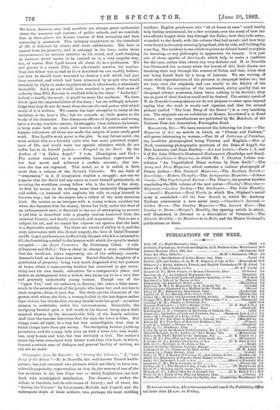NOVELS.—The Golden Prime. By E. Boyle. 3 vols. (Chapman and
Hall.)—Mr. Boyle has made acquaintance with many strange places and people, and has the art of describing them in a very vivid and effective way. Of this variety of experience and this faculty he made excellent use in the novel before _us. His two young heroes (who, both as children and as "grown-ups," remind us somewhat of the characters which Henry Kingsley used to draw), having various reasons—of which love is, of course, one—for leaving civilised life, make their way into the remote East, and certainly succeed in find- ing a change. They fall into the hands of a pirate tribe in Borneo, and go through some very lively experiences in consequence. All this part of Mr. Boyle's tale is told with remarkable spirit. The pirates, among whom the two chief personages are the Princesses Isa and Aysha, are very different from the conventional pirates whom we are accustomed to meet in the literature that is supposed, oddly enough, to be specially appropriate to Christmas. They have an undoubtedly genuine look. That impresses itself at once upon the reader, whether or no he happens to have any special acquaintance with this phase of human life. And, indeed, all the picture of Eastern life which Mr. Boyle gives us in his second and third volumes, with its brilliant colours and sombre shadows, is marvellously real. We should say that it may be compared for effectiveness with any- thing of the kind that is to be found in recent fiction. Nor is Mr. Boyle deficient in the power of describing quieter scenes. There are two love-stories in his novel ; both of them are good ; that in which we meet with Sweyn Garrow, the masterful young Englishman, and Jehanne de Pen:mac, a high-born French girl, who is by disposition and tradi- tional habits of thought his very opposite, is nothing less than excel- lent. It can hardly be said that The Golden Prime is a first-class novel. Mr. Boyle's pen, though not unpractised, as readers of that curious book of adventure, "Camp Notes," will be aware, has not, we fancy, been employed before in a book of exactly the same kind ; bat it has many of the qualities which go to produce such a book. It has this merit certainly in no common degree, that there is not a dull page, we may say a dull line, in it from beginning to end.— Donovan. By Edna Lyall. 3 vols. (Hurst and Blackett.)—A somewhat curious incident encounters us early in the first volume of Donovan. The hero is expelled from a public school for playing at cards. This is a little surprising; but it is very much so, to find that before ex- pulsion he has to undergo the ceremony of "running the gauntlet."
We know, however, that lady novelists are always great authorities about the manners and customs of public schools, and we conclude that in these places the Roman custom of first scourging and then executing is preserved. This unhappy experience on the threshold of life is followed by others still more unfortunate. The hero is
misted from his property, and is unhappy in his love ; under these circumstances, he accepts atheism as his creed, and card-sharping (a business which seems to be carried on in a very singular way, but, of course, Miss Lyall knows all about it) as a profession. His evil genius is a cousin Ellis, who afterwards marries his mother. That this fellow was as bad as he is described we can readily believe, but that he should have ventured to destroy a will which had just been executed, and which had been witnessed by people who would certainly be likely to make inquiries about it afterwards, is absolutely incredible. Such an act would have required a great deal more of audacity than Ellis Farrant is credited with in the story. "Audacity," indeed, is hardly the word ; it would be more like madness. We have dwelt upon the improbabilities of the story ; but we willingly acknow- ledge that they do not do more than obscure the real power with which much of it is written. We cannot but take exception to many of the incidents in the hero's life ; but we concede no little praise to the study of his character. The disastrous effects of injustice and wrong upon a strong, sensitive nature, its straggles, when fallen to its lowest, to keep some hold on truth and honour, and its restoration under happier influences, all these are made the subject of some really good work. Miss Lyall's weak point is the plot. In any future novel, she must submit this to a friendly critic who has some practical experi- ence of life, and would warn her against mistakes which do not suffer her to do herself justice.—Tenipted by the Devil. By the Author of "A Fallen Angel." 3 vols. (Remington and Co.)— The author ventured on a somewhat hazardous experiment in her first novel, and achieved a certhin success ; this suc- cess she has not repeated. This novel, as it is called, is little more than a volume of the Newgate Calendar. We see little of "temptation" in it, if temptation implies a struggle ; nor can we suppose that the Devil had any cause to exert himself particularly, in securing the worthless young fellow who is the hero of the story. At first, he seems to be nothing more than eminently disagreeable and selfish,—a husband who neglects his wife to enjoy himself in his own way ; but he developes into a villain of the most atrocious kind. He carries on an intrigue with a young woman, murders her when she harasses him for money, buries her body under the floor of an unfrequented attic, is detected in the act of attempting to remove it (all this is described with a -ghastly realism borrowed from the criminal Courts), and finally executed, still impenitent. This is not a subject for art, and we cannot but express our opinion that the book is a deplorable mistake. Yet there are traces of ability in it, and the story interwoven with this dismal tragedy, the love of Isabel Tennear and St. Leger, performs not ineffectively the part which it is intended to fill, the furnishing a relief to the horrors with which the novel is mainly occupied.—An Angel Unawares. By Courteney Grant. 2 vols. (Chapman and Hall.)—This is about as strange a story, 'considering that the incidents, taken separately, are of the ordinary, unmelo- dramatic kind, as we have ever seen. Rachel Sinclair, daughter of a gentleman of propeity, being very much disgusted with her position at home, where a mameuvriug brother has contrived to get every- thing into his own hands, advertises for a companion's place, and makes an arrangement with a widow, who tarns out to be a very fast and generally undesirable young woman. Though one of the "Upper Ten," and not unknown in Society, she takes a false name, much to the astonishment of the people who know her, and, not less to their surprise, drops it next day. She finds out the character of the person with whom she lives, a woman foolish to the last degree rather than vicious, but thinks that she may be able to do her good,—a curious mission to undertake, under the circumstances. Meanwhile, the intriguing brother gets a will made in his favour, being not a little assisted therein by the inconceivable folly of the family solicitor. And then the heroine discovers that the man she loves is false. But things come all right, in a way not less unintelligible than that in which things have been put wrong. The intriguing brother yields up possession, and the young lady puts op with a lover who was, doubt- less, very honest and true, but was certainly a fool. The author's name has been associated with better work than this book, in which, beyond a certain ease of dialogue and general facility of writing, we can see no merit.





































 Previous page
Previous page